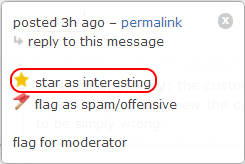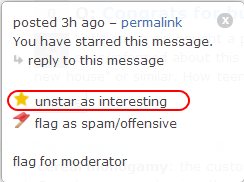These are normal common messages most of us who've chatted in SE chat interfaces have seen. I find the way the negation prefix un- "acts" intriguing.
- Why would I star and unstar a chat message as interesting? Does "unstar as interesting" mean that I unstarred the message because it was interesting? But that doesn't make sense, even though it does regarding "star as interesting".
- How does "un-" function in these two phrases? It seems to me that it's more like
un-[star as interesting]but how is that possible? How can a prefix modify a whole sentence, as opposed to modifying only the verb phrase [star]? I'm sorry if I don't know what I'm talking about; I ran into trouble trying to analyze this.
I'm more interested in the grammatical explanation behind the acceptability of the sentence "unstar as interesting" and how it could possibly mean, if it does, "to remove the star from a message previously starred due to being interesting". Please don't deviate much into the meaning nuances and/or possible replacements.


